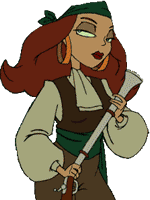|
Sigma-X posted:Who else doesn't make videogames aside from Book Eagle? I thought we were all cool kids living the dream. I spent most of my working life at Sierra/Vivendi/Vivendi Games Mobile before (getting laid off) becoming a contractor and now just recently left the industry to work for a company that handles financial transactions and payment specifically for game companies. Does that make me like a game middleware guy now? I'm the only game-backgrounded person in the office and my sole job is to handle game publisher/studio relations. They also pay so much more then any game company I worked for ever did I don't think I'm going back.
|
|
|
|

|
| # ? Jun 6, 2024 02:20 |
|
Shalinor posted:After a phone interview, try and prep up a few small things to add to your portfolio, sprinkled across the weeks. Bonus points if they relate to questions that were asked during the interview. Timeline should look something like this: This is the prime reason behind how I found my current position. Within the realm of appropriate decorum, latch on like a pitbull and Do Not Give Up.
|
|
|
|
Diaghilev posted:Within the realm of appropriate decorum, latch on like a pitbull and Do Not Give Up. Just in case there's someone for whom reasonable decorum might not be clear, all of the following methods are Right Out (tm):
|
|
|
|
wodin posted:Just in case there's someone for whom reasonable decorum might not be clear, all of the following methods are Right Out (tm): This is an awesome list.
|
|
|
|
wodin posted:[*]Leaving homemade baked goods Save this for when you actually get the job.
|
|
|
|
wodin posted:[*]Leaving homemade baked goods with your resume on top (google "digi-tanks cookie caper")
|
|
|
wodin posted:
Would it be valid to send them seperately, preferable the sweets before the application? (No, I won't send cookies to anyone. Even if I did, they would get stale before they arrive.)
|
|
|
|
|
DancingMachine posted:So I guess I'm not the only one who finds it a little off-putting that the most prolific posters and advice-givers in this thread don't actually work in game development. I'm on the outside looking in at this point. But that's why I came here asking for advice instead of giving it 
|
|
|
|
I think the reason you don't see a lot of posts from people actually working is there isn't a whole lot to talk about, much of the time. We've also got such variety in what people do in this thread, and everyone has such specialized roles, it's hard to find interesting, common topics for people. The people looking for jobs have a common thing everyone can relate to, and the job search is their largest focus. To provide some contribution, we've recently switched from rolling our own tech for 3DS / other platforms to all Unity on iOS. Unity is such a strange engine, for each thing it does that is amazing, modern, and provides a strong workflow, there is often something completely missing that I thought was totally standard for game development. Unity really does not play nice with source control, especially Perforce. For the iOS switchover, we had done a few iOS games before in our old tech, so it's not entirely new there. Also, I love working on handheld, and iOS is the leading handheld platform. Going all digital, with living games is an odd adjustment, I'm used to once it's out the door, it's done. I miss physical buttons, but it's not the end of the world, especially after working for 3 years on platforms with only one analog stick (PSP then 3DS).
|
|
|
|
Hey there fellow Game Devs, I've got a question for anyone who can answer. I figure I could ask here, rather than start up a new thread. Basically I am seeking information about Video Game Patents, it's a topic which I am highly uninformed and there are certain nuances that I don't quite grasp. Maybe some of you might even be able to point me to a good resource online I could read. I suppose putting my questions in a list will be the most clear;
2) Following the above questions, are there effective or safe methods of circumventing these types of patents? (which quite frankly, I believe to be a little ridiculous) Should you be worried about crossing the line on some of these patents? For example in the case of "Hovering Arrow above Head in Driving Game" would I be able to put a Hovering Arrow at the BOTTOM of the screen to circumvent this patent?? 3) As a developer, (or independent developer), how are you supposed to know all patents which exist when designing/releasing your own game? What methods could you use to ensure that whatever title you release is safe from any legal disputes? 4) Is it possible to patent your own design concepts (which haven't been done before)? What exactly does it require for one to do something like that? (Apart from what I assume, money and a good patent lawyer) Well apart from these questions, I wouldn't mind just hearing your opinions on Patents in general for Video Games. Are they warranted/necessary, or are they a little abusive?
|
|
|
|
Chainclaw posted:To provide some contribution, we've recently switched from rolling our own tech for 3DS / other platforms to all Unity on iOS. Unity is such a strange engine, for each thing it does that is amazing, modern, and provides a strong workflow, there is often something completely missing that I thought was totally standard for game development. Unity really does not play nice with source control, especially Perforce. There's kind of 4 "factions" in our studio (EDIT: LEGO, that is - GBG is focused on UDK/Unity) right now, as far as future engine use goes. There's the HTML5 faction, the Flash faction, the Unity faction, and the Trinigy faction. With Unity, we're confident we could do mobile games on it, but are very, very leery about it for anything else for precisely the reasons you describe. HTML5, we know we want to move to eventually, but there's not much there yet and we'd be going up from bare metal. Flash, not a great option for mobile, and many of the same issues as HTML5. Then there's the Trinigy faction. It really seems like a great engine, the licensing seems reasonable, etc, but we're up against the problem of justifying a different engine when there's already substantial sunk cost in our current engine (but which will never be an option on mobile, etc). Still not entirely sure how it will work out, and may just come down to the business decisions. Personally, I'd have the most faith in Trinigy. I use Unity, it's fine, it'd be a fine option for just mobile, but... eeeeh, not for big online games with large teams. Then you look at Trinigy, which also does mobile, and you start to wonder why you'd fracture your team to use Unity for just-mobile. Shalinor fucked around with this message at 16:58 on Oct 27, 2011 |
|
|
Happy Blue Cow posted:Hey there fellow Game Devs, I Am Not A Video Games Lawyer, but, as far as item 3, the situation is not so much that all the entities with ridiculous design concept patents have stopped you from using them, it's more that if you use them and make a shitton of money they can decide to enforce the patent in order to get some of that money.
|
|
|
|
|
hailthefish posted:I Am Not A Video Games Lawyer, but, as far as item 3, the situation is not so much that all the entities with ridiculous design concept patents have stopped you from using them, it's more that if you use them and make a shitton of money they can decide to enforce the patent in order to get some of that money. Well that's very  to hear. to hear.It gets me wondering how SEGA managed to get around NAMCO's Patent of having a "Mini-games during Loading Screens" with Bayonetta (They had an Empty Void area, where you could try out a bunch of different attack moves and combos during the loading).... Is it because it's not considered a Mini-game? Is it because they paid NAMCO the rights to use their patent? Is it because of the way it's coded or loaded into the game... or maybe it's not considered auxiliary code?
|
|
|
|
Happy Blue Cow posted:Well that's very "The size of the auxiliary game program code is small compared to the size of the main-game program code, and the relationship between the auxiliary game program code and the main-game program code is such that the auxiliary game program code is loaded first, before the main game program code." I Am Not A Lawyer, but pretty sure you could make a compelling argument that Bayonetta's movement and combat are not auxiliary code. That patent would seem to apply only to those cases where you create an entirely separate minigame that has nothing to do with the central game's code - think minigame in the Flash loading screen sorts of things. ... and now I know why that idea I had for that in LU got shot down way back when. God dammit. I hate software patents. EDIT: VV I am buddies with our audio programmer. We're FMOD. It is freaking awesome - you can do some really neat stuff with shifting music mixes as you move through a level. Shalinor fucked around with this message at 17:20 on Oct 27, 2011 |
|
|
|
Hey game audio goons, which sound engine are you guys using? Wwise/FMOD/internal tech/Frostbite FWIW I'm using Wwise and I thought it was the poo poo Until I read through Frostbite's HDR audio system 
|
|
|
|
Shalinor posted:To also contribute along this line: Every problem we have with Unity we're like "This is crazy, how do people deal with it?" and then we remember that the vast majority of Unity users are super small less than 5 man teams, that don't iterate heavily on assets. Luckily for us Unity is itself heavily moddable with editor scripts and the like, and we're just rolling a giant pile of tools for handling large teams. edit: I also love how silly the idea of "small" and "large" teams are. Our team sizes are the same as they've ever been, but in the past when talking to console devs, our teams felt super tiny. Now compared to many iOS devs, our teams feel massive. Nothing has changed for us, though. Chainclaw fucked around with this message at 17:23 on Oct 27, 2011 |
|
|
|
I wanna make games! Except I can't draw, program, or grasp the concepts of math. I can however, write, manage, organize, advocate, and learn. The vast majority of what goes into making a game is over my head, how can get a better understanding of the processes behind game production and publishing? To clarify, I'm not looking to be a writer, nor do I consider it a realistic goal. I do however want to learn more of everything relating to the art of making video games, so I can ultimately find the best fit for myself. At the very least, I'm willing to give everything a try. Here's some of my In a nutshell; I'm 20, out of high school, but not attending any college or trade school. Any hope for me?
|
|
|
|
Meh, I'm one of those prolific partially in partially out types. In the past I've worked directly in development (production) as well as QA and writing. But the majority of my long term work has been in support functions like management, law, and PR; or in ancillary functions like journalism; and currently I'm double-hatting with both my firm in the industry and other work outside the industry. I'd disagree that I can't speak as a voice of authority on certain things. No, I couldn't argue with Shalinor about the finer details of z-buffers and space cockpits, but I can certainly say what I've seen work in my experience, and what my clients do. Plus, there is a lot of benefit in being networked across the industry at higher (e.g. management/corporate) levels that can be overlooked or inaccessible at the technical/working level. In short, if you don't like what people have to say, call them out on it. I disagree with Black Eagle a lot of the time and we end up having great arguments over it (mainly on G+, sometimes here). But there's a huge difference between people associated with the industry in a support sense who still "know" what's what, and some kid who doesn't know poo poo about poo poo but will swear up and down to you that you're a loving moron unless you learn python first before C++.
|
|
|
|
Happy Blue Cow posted:Hey there fellow Game Devs, Hi: I am a game lawyer but patents are one of the few things I don't practice, however I know generally how they work-- I'll respond inline. quote:
The patent system is fundamentally broken. But not delving into that one here -- the lawgoons thread might be a place (lots of patent examiners/patent attorneys there). Basically there are two kinds of patents involved here -- both are utility patents and provide the same protections as any other utility patent (e.g. what most people think of a patent, as opposed to design patents which are different and cover mostly ornamental functions). The first kind is a traditional patent covering some sort of invention. This category covers things like new server hardware or a GPU chip. What you're looking at are the second kind, "business method patents", or "method patents", which seek to patent some sort of procedures for doing something, rather than a tangible object. Method patents are where most software patents fall under, and have always been politically touchy, despite having existed since the beginning of the patent system in the 1700's. It would delve waaaay too far into history to explain WHY they exist, except that the USPTO has traditionally held the view that they are legal, the federal courts have consistently upheld that. Most recently in the past year or so, the Supreme Court decided a case called In Re Bilski, in which the Court refused to impose a blanket rejection on business methods -- instead it ruled that in order to get a business methods patent you must pass the "machine-or-transformation test." I'm not a patent attorney (only attorneys with hard science backgrounds are eligible for the patent bar, which is its own separate subject matter bar beyond the general bar exam) so the best I could do is point you to this link about the test: http://en.wikipedia.org/wiki/Machine-or-transformation_test -- but basically it means that the method/process must be tied either to a machine that does something, or transforms something into something else. Now, that sounds pretty simple, but it's hugely loving complex to the point that I don't understand poo poo about it and things that make no sense could fit under those categories. Moreover, the Court has held that it's not the ONLY test allowed. This is what happens when you require that lawyers must have science backgrounds to prosecute patent claims and litigate them; but judges need not have any technical knowledge to rule on them (one Justice famously couldn't tell the difference between a text message and a pager.) quote:2) Following the above questions, are there effective or safe methods of circumventing these types of patents? (which quite frankly, I believe to be a little ridiculous) Should you be worried about crossing the line on some of these patents? For example in the case of "Hovering Arrow above Head in Driving Game" would I be able to put a Hovering Arrow at the BOTTOM of the screen to circumvent this patent?? Yes -- finding them tends to be incredibly expensive even by legal standards, as patent cases almost always end up in the hundreds of thousands to millions of dollars, patent trolls are incredibly common, and the obtuse language of patent claims (which is archaic and specific to the point of rivaling heraldry) mean that attorneys are almost necessary to figure anything out. This is why developers need to have their games and companies IP audited to identify these risks -- you can then make a decision as to whether or not to go ahead anyway and take the risk that a rival will not want to spend 500,000 to a million dollars to sue your small company into bankruptcy and not really make anything off it. quote:3) As a developer, (or independent developer), how are you supposed to know all patents which exist when designing/releasing your own game? What methods could you use to ensure that whatever title you release is safe from any legal disputes? You can search USPTO's database, but claim construction is such a specific topic that you may or may not find what you're looking for, and no offense but you probably wouldn't read it correctly (hell, even I can't always read claim construction correctly.) Patent searching is an art -- and an expensive one. You are definitely best off hiring an expert. quote:4) Is it possible to patent your own design concepts (which haven't been done before)? What exactly does it require for one to do something like that? (Apart from what I assume, money and a good patent lawyer) Yes, sometimes. You have to meet the requirements for any other patent (new, novel, non-obvious) but now in a post-Bilski environment everything is unclear. Realistically, you need to hire a lawyer. It will cost you between $10,000-25,000 to file for your patent assuming you have no opposition or adverse responses from the USPTO. If you have to do a back and forth with them, expect that to shoot up to $50,000-75,000. If you are filing in a "hostile" environment, where there are patent trolls or you expect litigation, you're looking at $100,000+ easily. That's before litigation. Per patent. And the process can take up to a couple of years or more. Yeah, the system is loving broken. Leif. fucked around with this message at 19:33 on Oct 27, 2011 |
|
|
|
Diplomaticus posted:Hi: I am a game lawyer but patents are one of the few things I don't practice, however I know generally how they work-- Im at 1% laptop battery but I'll definitely follow up when I find an outlet.
|
|
|
|
Diplomaticus posted:Hi: I am a game lawyer but patents are one of the few things I don't practice, however I know generally how they work-- Im at 1% laptop battery but I'll definitely follow up when I find an outlet.
|
|
|
|
IANAL but as far as I can tell if you intend to make millions of dollars it seems like you just need to be owned or published by a big company that has its own umbrella of protective ridiculous patents. Software patents are all about mutually assured destruction between the big kids, putting the little kids in a very bad situation. Nobody really has the bandwidth to research every single facet of the game to make sure they're not violating some patent or another, especially given how fast functionality changes in a game right up to the ship date. But of course I couldn't speak on the topic with any authority.  Edit: I did actually co-author a single software patent, much to my shame, so I do know a tiny bit about them.
|
|
|
|
Shalinor posted:To also contribute along this line: I'm confused, why are you considering 2D engines like HTML5 and Flash alongside 3D engines Unity and Trinigy? It seems like those are 2 totally different discussions? Diplomaticus posted:Meh, I'm one of those prolific partially in partially out types. In the past I've worked directly in development (production) as well as QA and writing. But the majority of my long term work has been in support functions like management, law, and PR; or in ancillary functions like journalism; and currently I'm double-hatting with both my firm in the industry and other work outside the industry. You certainly have valuable perspective to provide on matters of law and PR. And I think your contributions on other topics are also often interesting. It's really a matter of tone more than content that I'm getting at, and of course not just with you specifically. I may be a delicate flower or something but a little humility helps me digest communications a lot better.
|
|
|
|
Senso posted:I'm a sysadmin in a game company who wishes he was a game designer, it's ok. I'm a game company Web Programmer (Database designer, website developer, server designer/developer) who wishes he was a game company sysadmin. There's always a step below. 
|
|
|
|
OneEightHundred posted:While you're at it, could you explain how non-profit entities that don't sell anything (i.e. FSF) are able to keep their trademarks. Diplomaticus posted:Meh, I'm one of those prolific partially in partially out types. Adraeus fucked around with this message at 19:33 on Oct 27, 2011 |
|
|
|
Yeah, this is all inclusive, I didn't mean to suggest there is some sort of stratification here, it's a large industry (although let's continue to exclude retail Gamestop employees). What I think some people have been reacting to, however, is that certain folks have an opinion on everything, even things outside of their experience or skill set, and it might be useful to have a few less artists commenting on programming side, etc.
|
|
|
|
BTW scroll up -- I answered the patent question in an edit.Shalinor posted:Have you tried pottery classes? In middle school. I made a lovely ash tray. OneEightHundred posted:While you're at it, could you explain how non-profit entities that don't sell anything (i.e. FSF) are able to keep their trademarks? My understanding is that their mark is used in commerce due to their donation-focused activities, or in the case of groups like FSF/EFF, their litigation activities. Did I mention that the trademark system is broken too? Yeah, there's a reason that despite having lived two blocks from the USPTO I tried to avoid it as much as possible. Also, note that you can sustain a 1(b) "Intent to use" trademark for quite a long time before actually USING it. DancingMachine posted:IANAL but as far as I can tell if you intend to make millions of dollars it seems like you just need to be owned or published by a big company that has its own umbrella of protective ridiculous patents. Software patents are all about mutually assured destruction between the big kids, putting the little kids in a very bad situation. Nobody really has the bandwidth to research every single facet of the game to make sure they're not violating some patent or another, especially given how fast functionality changes in a game right up to the ship date. Bolded for truth. This is absolutely right. Black Eagle posted:We should really stop this nonsense. There are many roles to play within the game industry that have nothing to do with art, programming, design, or sound. There's an entire business arm that makes this an industry, that gives the creatives and everyone else salaries and benefits, and that gets products to market. The business of game development is not all about, metaphorically, the artist, easel, canvas, and paints; it's also about the patron, the venue, and the audience. This is the "game jobs" thread, which sounds all-inclusive to me. Oh, I'm not disputing that -- you know that I'm the first person to get up and defend that portion of the industry. I meant it more in the direct sense that I'm splitting my time between working for the government in a non-games related field, and working for my firm in games. So literally, partially in, partially out.
|
|
|
|
Black Eagle posted:"Nonprofit" doesn't mean you don't sell anything. It doesn't mean you don't have revenue. And it certainly doesn't mean there's no profit.
|
|
|
|
OneEightHundred posted:I realize this, but I'm referring to organizations or foundations that offer products strictly free of charge. Like take the FSF for example, they've got a merch shop but ultimately what they deal in is software, and they don't seem to have a cent of revenue from that. What stops someone from else from producing software under the same name, or registering a conflicting trademark, if a trademark requires use in commerce? Trademark rights arise from a number of places. State law/common law trademarks arise under whatever rules the state decides. They can arise from a mark being placed on the registers, which in theory requires use in commerce but due to slips from the examiners doesn't necessarily mean that a mark was being used. But the core purpose of them is to protect consumer goodwill by allowing them to identify the source of a good or service. So when say, Susan G Komen trademarks the pink ribbon logo, they are doing so to protect the goodwill in their brand name for their charitable donations and services. Make sense? -e- A brief search, certainly not in depth but nobody's paying me for it, shows FSF has a single live trademark - GNU. It's registered in a metric fuckload of categories and is on the principal register. First use in commerce 1985 -- most recently reregistered July 2011 (normally you re-register every 5th and 10th year). 85380218 Leif. fucked around with this message at 19:57 on Oct 27, 2011 |
|
|
|
DancingMachine posted:I'm confused, why are you considering 2D engines like HTML5 and Flash alongside 3D engines Unity and Trinigy? It seems like those are 2 totally different discussions? ... "or" - we could just use Unity and depend on its Flash/HTML5 export capabilities in the near future. Which is the direction I'd probably prefer, if one of those were decreed the way forward. I'm just not a fan of reinventing the wheel, even if we do have the studio size to do it.
|
|
|
|
Diplomaticus posted:The patent system is fundamentally broken. Wow, thanks so much for your responses everyone. Highly informative. This mainly spurred from a discussion I was having with a co-worker about putting Mini-Games during a Loading Screen, only to discover NAMCO actually patented "it" which explains why its not seen anywhere ever. On top of that, NAMCO recently published and released Ridge Racer 3DS, which has severely long loading times, and does NOT use their own Patent to mask it. 
|
|
|
|
OneEightHundred posted:I realize this, but I'm referring to organizations or foundations that offer products strictly free of charge. Like take the FSF for example, they've got a merch shop but ultimately what they deal in is software, and they don't seem to have a cent of revenue from that. What stops someone from else from producing software under the same name, or registering a conflicting trademark, if a trademark requires use in commerce?
|
|
|
|
So Black Eagle, saying "I represent the part of the industry that pays all of your salaries!" is probably not the best way to ingratiate yourself to the core folks in this thread. Especially when you really just rub elbows with the folks on that side of the business, not actually being directly a part of it yourself. Now I believe that you have valuable insights to share. And I'm sure your book will be well-worth reading. Just dial back the self-importance a little bit. Tricky Ed posted:Yeah, well, it's busy on the inside. I just got home, myself... Hehe, yeah I am on vacation right now. Posting during the day is normally pretty rare.
|
|
|
|
Ok, DancingMachine, Black Eagle, Sigma-X, everybody. This needs to end. This is stupid. Please stop dancing around the issue of whose penis is bigger. If you all want someone to judge, great, go find yourself a bar, slap them out on a table, and ask the barman. Beyond that, this is an inclusive thread, where we do not require 3 forms of ID before accepting you as what you say you are. Business people are notoriously hard to pin down as "actually in the know." So are lawyers. So is anyone that doesn't directly produce game content. It's the nature of the business - they're facilitators, they're glue, they're not the content. They're still welcome in this thread, though, and until we've got some reason to really doubt them, christ, let's avoid the sissy fighting. Let's just talk about game business and tell embarrassing stories of dudes fighting coke machines and stuff. EDIT: VV Yeah, it's... eh, it's a mess. There's still a lot of fighting over 3D web standards, and trying to pin the winner right now AND be profitable in the next 2 years / not just make the long bet is difficult at best. I am glad I am not the one making the business call, and justifying the decision via crystal ball and blog postings. That job would suck right now. Shalinor fucked around with this message at 20:30 on Oct 27, 2011 |
|
|
|
Shalinor posted:They're not 2D engines. Molehill on Flash-side and canvas on HTML5-side are moving in the direction of browser-based 3D gaming. Both will take some work to build an engine for, but we're a large studio - we could do that, if such were decided. Wow, Stage3D looks super cool. Hadn't seen that before. I'd be nervous about betting on Flash for the long term though. They have a good chance of maintaining their hold on the market, but I wouldn't bet my studio on it. I'd feel much better about going down the html 5 3d canvas/opengl route. Of course as you say - it doesn't exist yet. It does suck to make users download another plugin or engine install to play your game. But it's the safe bet right now. I think you're right. And in a few years time, unity will probably be working much better for large teams, while the other options will still be catching up to where unity is right now.
|
|
|
|
Shalinor posted:Let's just talk about game business and tell embarrassing stories of dudes fighting coke machines and stuff. The guy you're referencing came after me once when I was with Wikimedia, over his Wikipedia entry. It was pretty loving lulzy.
|
|
|
|
Diplomaticus posted:The guy you're referencing came after me once when I was with Wikimedia, over his Wikipedia entry. It was pretty loving lulzy. David Brevik's kinda similar. He was our studio head for a short while, and he wore jeans, a comfortable button-up, and spoke very plainly to us. He seemed like a pretty decent guy in an unfortunate position, but you say Brevik to anyone else, and you'll just get a giggled "Flagshipped!". The most recent one is the LA Noire studio head. I'd really like to just meet the guy. Maybe he's a tool, maybe he isn't, but the press crucified him, and that story will follow him for years. Like most other media, we tend to pillory anyone that does something weird, and blame studio heads for entire busines processes and vague rumours for which they had only a tiny bit of actual blame, if any. Shalinor fucked around with this message at 20:50 on Oct 27, 2011 |
|
|
|
Shalinor posted:business and ... coke ...and stuff. What making games is really about!
|
|
|
|
-e- redacted
Leif. fucked around with this message at 09:56 on Aug 6, 2013 |
|
|
|

|
| # ? Jun 6, 2024 02:20 |
|
devilmouse posted:What making games is really about! I thought there were groupies?!?
|
|
|

























